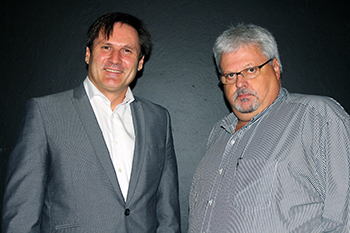Latest News Archive
Please select Category, Year, and then Month to display items
08 April 2020
|
Story Prof Francois Vreÿ, and Prof Hussein Solomon
![]()
The international response to the Corona Virus Disease 2019 (COVID-19) as a health security threat stimulated an international response that commenced with drastic, but localised actions in China, but responses rapidly manifested in more extreme measures in the rest of the world. Amidst international efforts imposing extraordinary national and international movement restrictions and a rush to find a medical cure, two questions arise. First, how does COVID-19 as a health security threat feature within the global security debate and second, how to explain the harsh responses that one observes.
Read more...
Internationally-renowned futurist proposes innovation in corporate management
2016-05-10

Pieter Geldenhuys, guest speaker at the seminar, who mapped the future of corporate management (left) with Dr Vic Coetzee, Senior Director: Information and Communication Technology Services at the UFS (right).
Photo: Hatsu Mphatsoe
|
Humans need to adapt their thinking to the world’s changes. This is Pieter Geldenhuys’s conviction.
The Information and Communication Technology Services (ICT) at the University of the Free State hosted a seminar on 22 April 2016 at the Bloemfontein Campus. Geldenhuys, the Director of the Institute for Technology Strategy and Innovation at North-West University and internationally-renowned futurist, presented his views on technology, innovation, and corporate management on this occasion.
Geldenhuys, a well- known speaker, academic, and futurist, is in the business of identifying opportunities in the changing technological and social landscape with the aim of assisting companies to prepare for the future, while being an active agent in defining it. Lately, he has been exploring the concept of a new kind of management science, which he believes is a prerequisite for institutions such as ours.
This management science incorporates physics in improving corporate management. “We have an unbelievable grasp of the world of physics,” he said, suggesting that we use our knowledge of nature to capitalise on individual and collective strengths within institutions.
He said that minor changes can change one’s future or that of an organisation completely. He even went as far as to state that the culture of an organisation is the one that determines how well you do. Relating to the adaption of organisations in a constantly changing and dynamic environment, Geldenhuys advised that, “when faced with disruption, don’t retaliate; accept.”
By making use of different tools, such as technology aw well as social and business trends, Geldenhuys is adamant that corporations and institutions will adapt easily to the world’s complex systems.